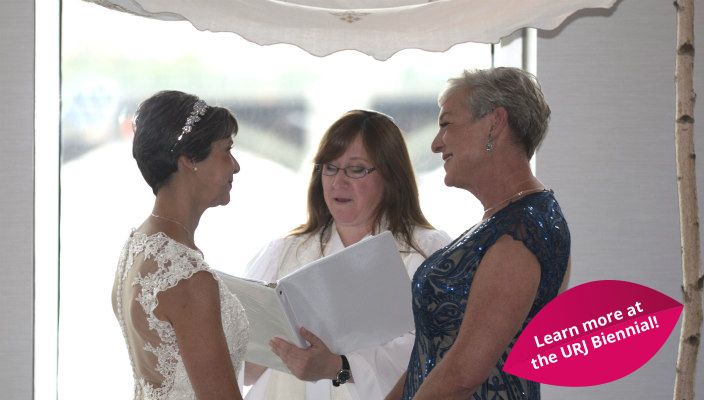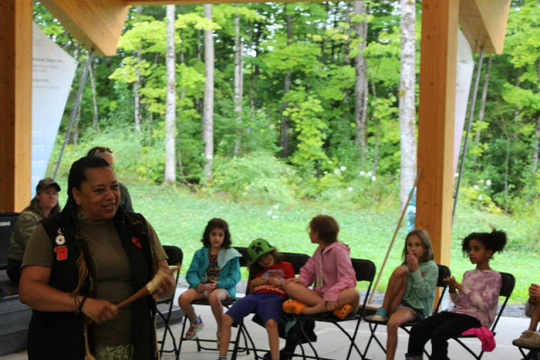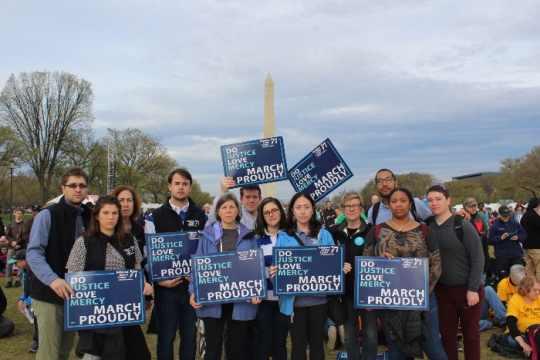
When it comes to being audaciously hospitable, sometimes a congregation doesn’t need a specific initiative or program at all; rather, its commitment to welcoming can be seen in the small, seemingly unnoticeable day-to-day ways that the leadership and community interact with one another.
This was the case with Temple Emanuel of the Merrimack Valley (TEMV) in Lowell, MA, and its LGBTQ+ “Uninitiative,” a series of audaciously hospitable actions to welcome and support the congregation’s LGBTQ+ community. To learn more about the Uninitiative, for which the congregation won a 2019 URJ Belin Award, I spoke with Dana Rudolph, TEMV’s publicity chair and trustee.
URJ.org: What was the main inspiration to begin the work of LGBTQ+ inclusion?
Dana Rudolph: While we can’t identify an exact starting point, it was certainly motivated, throughout the years, by LGBTQ+ members and members with LGBTQ+ children or extended families.
What we now call our “LGBTQ+ Uninitiative” is not a specific program. It’s simply a value that manifests itself throughout our congregational activities to create an environment of diversity, inclusion, and equity for all of our members, specifically encompassing all sexual orientations, gender identities, and gender expressions.
Can you share some examples of such congregational activities and how they’ve provided a sense of belonging?
In addition to creating an all-gender bathroom, we made pronoun stickers available for people’s nametags at our High Holiday services and displayed an informational sheet about pronouns for people who wanted to learn more. [Editor’s note: See “A Quick Guide to Pronouns” for language to create your own.]
Our website and Facebook page also include prominent photographs of some of our LGBTQ+ members (including one of a couple being married by our rabbi), and our library contains LGBTQ+-inclusive books that accurately reflect the diversity of our community.
We’re also active in various LGBTQ+ social justice initiatives. Many of our members spent time and energy supporting a statewide ballot initiative to ensure that transgender people retained equal access to public accommodations, and our congregation is a member of Welcoming Faiths, a regional interfaith coalition dedicated to increasing LGBTQ+ inclusion in faith communities. In 2017, our rabbi signed an amicus brief in support of a transgender teen who was fighting in the U.S. Supreme Court for equality in school.
All of these actions help address anti-LGBTQ bias and incorporate inclusive practices in our community.
Why are these actions so vital for the well-being of all of your community members – and, for that matter, in all Jewish communities?
These actions align with the Jewish values of dignity for all humans, lovingkindness, social justice, and welcoming others. This means treating everyone with respect and dignity, which includes using people's correct pronouns and providing equal access to temple facilities, including bathrooms.
For example, telling someone they must use a bathroom based on our assessment of their gender, rather than their own, is to deny them their dignity and self-identity and adds stress, humiliation, and discomfort to every temple visit, when they must choose between entering the wrong restroom for their identity or not using the restroom at all.
If we communicate to one segment of our community they cannot be who they are, it sends a message to our entire community that we might not want others to be who they are. We all deserve to feel whole in this community and to share as much of our identities as we’re comfortable doing.
What impact have your inclusion initiatives had within the congregation?
Our LGBTQ+ members and members with LGBTQ+ family and friends continue to be beloved members. LGBTQ+ families continue to find a sense of belonging in our religious school and partner with our congregation for LGBTQ+-inclusive lifecycle events such as weddings, baby namings, and b’nei mitzvah for their children. We have supported them in all ways, from celebrating their joys to sitting shiva with them in their sorrow.
Do you have any stories about the “Uninitiative” you’d like to share?
One member told us that her LGBTQ+ identity has always been respected at our congregation, allowing her the freedom to share and explore other parts of herself without the constant need to explain only one area of her being.
Several years ago, another member transitioned to live as the gender she knew she was. The transition was difficult in different ways for both her and her spouse, and ultimately, they divorced – but they both found support in the TEMV community and remain active members. She said that while neither transitioning nor divorcing was a seamless process, “Today things are very good.” Her former spouse, too, told us, “I felt 100 percent supported by the TEMV community. This made things so much easier.”
My own family was immediately accepted and included in TEMV’s congregational activities without any pretense or awkwardness. My son attended the congregation’s religious school, where my spouse and I knew he was unlikely to be teased or asked intrusive questions about the fact that he has two moms. He also had the opportunity to meet people of other LGBTQ+ identities and to see them being welcomed in the community – a good lesson for him as he grows up.
A former teacher in our religious school, who identifies as nonbinary, said, “The whole community really embodies the kind of genuine and impactful inclusion work that I know the URJ strives for.”
What do you have planned for the future?
We will continue to support our LGBTQ+ members and those of us with LGBTQ+ friends and family through inclusive language, practices, and audacious hospitality. We will continue to participate in local LGBTQ+-related events (such as Pride), to speak out on related social justice issues, and, ultimately, to standardize inclusive practices in everything we do.
Check out the other 2019 Belin Award-winning projects and the congregations that developed them.
Posters about each award-winning project will be on display at the URJ Biennial, the largest Jewish gathering in North America, held December 11-15, 2019, in Chicago, IL. Register now to join thousands of Jews from around the world to learn, pray, share ideas, dance and sing, hear from inspiring speakers, reunite with old friends, create new connections, and more.
Have something to say about this post? Join the conversation in The Tent, the communications and collaboration platform for congregational leaders of the Reform Movement. You can also tweet us or tell us how you feel on Facebook.
Related Posts

Not Just a Checkbox: Diversity, Equity, & Inclusion Actions at URJ Camp George

9 Things to Consider When Creating an Inclusive Security Plan
